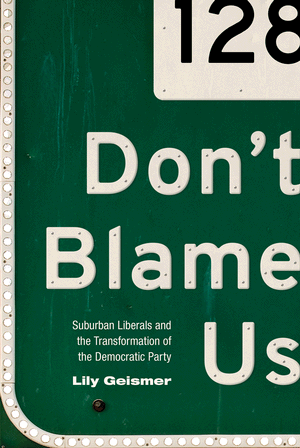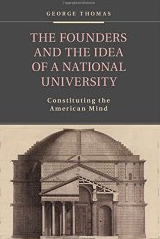In Don’t Blame Us: Suburban Liberals and the Transformation of the Democratic Party, Assistant Professor of History Lily Geismer challenges longstanding arguments that the rise of the right and the Reagan Revolution led to the decline of liberalism by looking at the liberal residents who lived and worked along the high-tech corridor of the Route 128 highway outside Boston.
 “The growth of suburban liberal politics and support for the Democratic Party in post-industrial, high-tech enclaves across the country proves that Massachusetts holds an influential, but not exceptional, position in national politics,” she writes. “Engineers, tech executives, scientists, lawyers, and academics in Silicon Valley college towns like Ann Arbors and the suburbs of many major metropolitan areas from New York to Seattle to Los Angeles, share similar political priorities and voting patterns.”
“The growth of suburban liberal politics and support for the Democratic Party in post-industrial, high-tech enclaves across the country proves that Massachusetts holds an influential, but not exceptional, position in national politics,” she writes. “Engineers, tech executives, scientists, lawyers, and academics in Silicon Valley college towns like Ann Arbors and the suburbs of many major metropolitan areas from New York to Seattle to Los Angeles, share similar political priorities and voting patterns.”
Nancy MacLean, author of Freedom Is Not Enough: The Opening of the American Workplace, considers Geismer’s study a “must-read for anyone seeking to understand the reinvention of American Liberalism since the 1960s.” Published by Princeton University Press as part of its prestigious Politics and Society in Twentieth-Century America series, Don’t Blame Us has also been the subject of a recent story in The Boston Globe.
In the broader spectrum, Geismer’s research links larger processes to local politics and reinforce the key role of the suburbs in shaping party politics, public policy and structural and racial inequality. Her research was based on archival material from politicians, state agencies, local organizations, and individuals in the suburbs. “One of the most useful sources turned out to be the letters to the editor of local newspapers,” she explains.
Geismer hopes her book will help scholars and the public to understand that liberalism and the Democratic Party haven’t declined since the 1960s but instead have changed, becoming increasingly suburban-focused. “There have been key advances and drawbacks to this shift,” she writes. “I hope the book will force many people, especially those who live in the suburbs and self-identify as liberal, to think critically about the relationship between their political priorities and their everyday lives.”
Educational visions

The Founders were convinced, writes George Thomas in The Founders and the Idea of a National University: Constituting the American Mind (Cambridge University Press), that the Constitution’s health and success vitally depended on educating and shaping American minds. An associate professor of government, Thomas examines the concepts of a national university and its contributions to the evolving democratic identity of the U.S. In the process, Thomas also exposes the tensions, already existing at that early stage in the nation’s history, between supporters of nationalism and localism. University of Notre Dame’s Sotirios Barber calls Thomas’ book “a major contribution to American constitutional thought.”